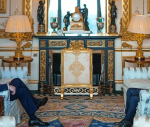You are here
A Bush-Clinton matchup?
Sep 14,2015 - Last updated at Sep 14,2015
It was not that long ago that pundits had the 2016 presidential contest pegged as a Clinton-Bush matchup. While that may still occur, I would not place a bet on it.
When media speculation first began about these two families meeting up for a rematch on the electoral battlefield, it appeared so inevitable that questions were raised about whether the whole thing smacked of “dynastic politics”.
It was a good story and so commentators had a field day.
Both campaigns emitted an aura of invincibility as Jeb Bush and Hillary Clinton had hired their respective parties’ key political operatives and proceeded to quickly raise more money and collect more major endorsements than any of their competitors.
Early polls showed both Bush and Clinton leading and favoured to win their parties’ nominations. That was then.
As the campaign season began, the aura of invincibility began to fade. In the first place, it became clear that many primary voters wanted something that neither Bush nor Clinton appeared to possess: authenticity.
In the same vein, many Republicans and Democrats were angry with their respective political establishments and with leaders who had told them one thing and did another.
On the Republican side, Bush and the rest of the GOP field of governors and senators ran smack into two non-politicians who, in most polls, are far and away leading the pack.
Donald Trump, billionaire showman, and Ben Carson, neurosurgeon, are currently capturing the support of about one-half of Republican voters.
Meanwhile, Bush is polling in the mid-single digits.
Just how disturbed the GOP base has become was in evidence after the last debate.
At its conclusion, the consensus among pundits was that Trump had performed not only poorly, but badly, and that Carson had been present/absent. But in the weeks following the debate, Trump’s lead grew and Carson significantly increased his polling numbers, while the candidates favoured by the GOP establishment (Bush, Marco Rubio and Scott Walker) lost ground.
Too many Republican voters, it appears, are mad at, fed up with, and just do not trust politicians.
Clinton has fared somewhat better, largely because she has, until now, faced a much smaller field of lesser known opponents.
Despite this, trouble looms over her candidacy. In national polls, she still holds a large, though shrinking, lead over her closest competitor, Senator Bernie Sanders.
Sanders, while not charismatic, is authentic and direct, and is mobilising huge crowds who are responding to his charge that the “game is rigged” in favour of the very wealthy to the detriment of the poor and the middle class.
In the two states that vote first, polls show Sanders either closing in on Clinton (Iowa) or leading (New Hampshire).
More disturbing for Clinton supporters are polls that show the impact the e-mail controversy has had on her personal ratings. More voters now view her unfavourably, and by a near two to one margin they see her as untrustworthy.
The second reason for the change in the Bush/Clinton fortunes had to do with the candidates themselves.
Neither proved to be an effective campaigner. They made too many mistakes and were awkward in their attempts to get out of the holes they had dug for themselves.
For those who thought that Jeb was the “smart one” — the Bush who should have been president — his lackluster performance to date has been disappointing.
He has repeatedly stumbled when confronted with both tough and easy questions.
His supporters were baffled by his failure to have a quick and ready response to questions about his position on the Iraq war.
After all, it was started by his brother over 12 years ago and was one of the most consequential foreign policy events of this century. His bungled response was inexcusable.
Clinton may very well make a great president. She is forceful and disciplined, and she understands the policy/politics nexus. But her campaign performance, to date, has been disconcerting to her supporters.
Instead of being able to project her issues and message as the dominant news of the Democratic primary, she has been hounded by a problem of her own making.
It has to be troubling to her supporters that she left herself open to attacks when she decided not to use the State Department’s e-mail, opting instead to set up a personal account on her private server.
Clinton has been in government long enough and knows how opponents and the press are “poised to pounce”. Her failure to consider the consequences of this private mail fiasco was, therefore, inexcusable, as was her long-delayed admission of personal responsibility for what she now admits was a “mistake”.
It is, of course, early in the election cycle, and money and strong, smart political organisation may yet win the day. At this point, however, it is hard to see how, even if Trump fails, his supporters would switch their allegiance to an establishment candidate, like Bush.
At the same time, as the e-mail saga continues to eat away at the Clinton’s support, it becomes likely that other Democrats may consider declaring their candidacy. This could change the entire dynamic of the race.
It is possible that Bush may bounce back and somewhat more likely that Clinton may recoup, but as I said, I would not place any bets on a Bush-Clinton 2016 matchup.













